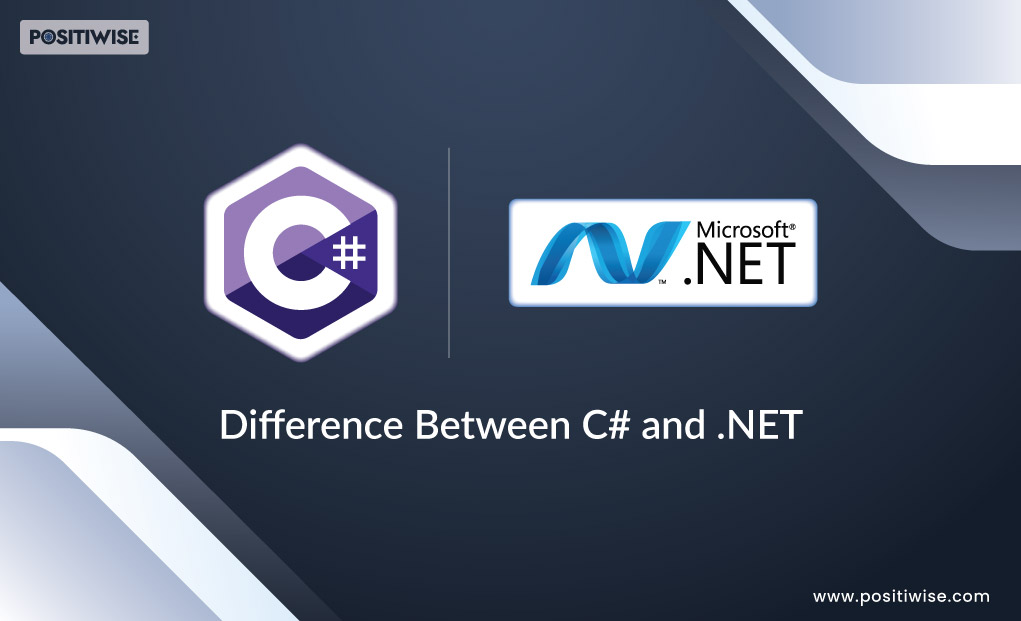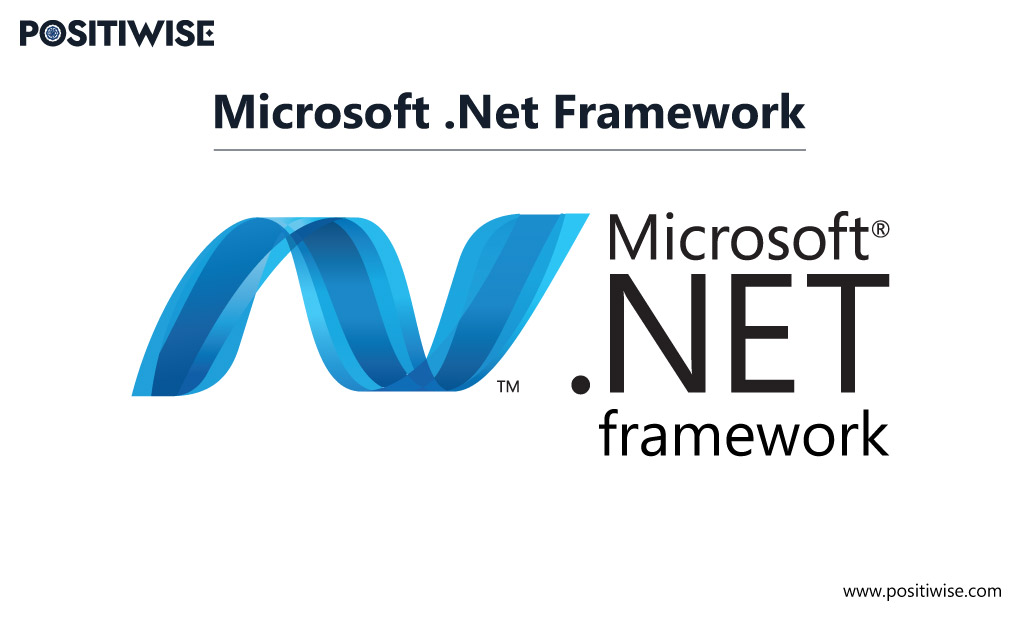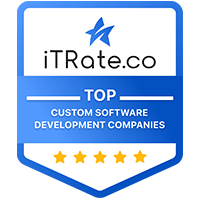Quick Overview:
The blog aims to provide a detailed overview of the .NET foundation and the C# programming language. You will learn the fundamentals, features, and advantages of these technologies. In addition, a complete differentiation table is provided with all the factors. By the end of this blog, you will understand how .NET and C# are different and inter-linked at the same time.
Everything You Should Know About .NET and C#
Understanding the difference between C# and .NET has been a trending discussion in the .NET development domain. Also, organizations seeking custom .NET software development often become confused about whether they require C# software developers or .NET developers.
But now, no more place for confusion will be left. Here, you will find all the details required to learn about .NET, C#, and the difference between them.
A Detailed Overview of .NET
Among all the development technologies available to build business applications, .NET is one of the most popular and highly used platforms. Microsoft developed, owns, updates, and supports it to provide all the required features to developers.
However, .NET doesn’t end as a software development platform, and it’s more than that. Numerous technologies exist within the .NET ecosystem, including but not limited to the following:
- .NET
- .NET Framework
- .NET Core
- ASP.NET
- ASP.NET Core
- ASP.NET Core MVC
- .NET MAUI and more…
Specific purposes, such as creating desktop, web-based, mobile, and IoT applications, utilize all the mentioned technologies (frameworks and libraries). In addition, the selection of technology also depends on its compatibility with other operating systems and digital platforms.
For instance, if you want to develop a cross-platform application, you can prefer .NET, and for Windows-only software, you can use the .NET framework. The .NET environment is pervasive and requires a significant amount of time to learn every concept under it. But, if you hire a company with .NET development expertise, they can help you choose the right tech stack.
Develop .NET Web Application with ASP.NET Technologies
Bring your web app ideas to ASP.NET development experts. Hire our skilled .NET developers to build secure, scalable web & desktop web applications.
Furthermore, you can utilize the primary three programming languages for leveraging features of .NET frameworks and libraries. The three languages include:
- C#: It’s preferred for benefitting from object-oriented programming.
- F#: It’s considered for writing codebases for robust applications.
- Visual Basic: It’s used for building type-safe applications.
With the combination of any of the mentioned programming languages and .NET technology, you can develop the most trending application models. There’s quite a long list for it, containing web, mobile, desktop, microservices, cloud, Internet of Things, games, and machine learning models.
As you know, programming languages leverage various technologies within the .NET ecosystem. So, let’s have a look at their comprehensive benefits and features:
- The built-in security features help to activate authentication, authorization, and access controls.
- The MVC architecture aids in focusing on all business logic and interfaces more appropriately.
- The extensive community supports in resolving issues.
- Microsoft support helps in patching vulnerabilities and thoroughly updating the application.
- Cross-platform compatibility leads to saving costs, time, and money.
- Microsoft, Samsung, Red Hat, Google, and other entities provide guidance for the .NET Foundation.
- The .NET applications are high in performance speed and provide utmost scalability.
- Small and medium-sized enterprises (SMEs) can easily afford custom .NET software development.
- The technologies in the .NET ecosystem are free to use and open-source.
A Detailed Overview of C#
As we get a glimpse of C# in the previous section, we know that it’s a programming language used for writing code to build .NET applications. It’s a modern and open-source language based on an object-oriented programming approach. Also, it has now secured its position in the top 5 programming languages used on GitHub.
You can instantly grab its fundamentals if you have written an application using Java, C++, or JavaScript. And you will also learn the implementation of asynchronization, type safety, generics, pattern matching, and records with it.
Additionally, C# can seamlessly integrate with .NET, as it supports the development of all major application models. You can use it for desktop, mobile, web, cloud, mobile, games, ML, AI, and IoT applications. Moreover, the standout feature is that all .NET libraries and frameworks are compatible with C#. You can take any .NET tech stack and start development.
To efficiently create a .NET software with C#, you should understand its below provided top features:
- Garbage collection for automatic memory reclaims from unreachable and unused objects.
- Exception handling for detecting error and recovery through a structured manner.
- Nullable types for safeguarding against non-referred variables.
- LINQ (Language Integrated Query) for processing the data from multiple internal and third-party sources.
- Asynchronous operations for building and deploying a .NET application for distributed architecture.
- Lambda expression for using functional programming mechanisms in your C# code.
Furthermore, C# runs on the .NET platform, using the CLR (Common Language Runtime). The .NET compiler converts C# code into an intermediate language and then translates it into platform-specific or machine language.
Once the compiler successfully converts the C# code into machine native code, it can execute the code on the compatible platform. Also, the C# codebase of a .NET application can communicate with Visual Basic and F# code, which is an added advantage for .NET developers. It helps professionals to curate a business application with all the required functionalities without any issues.
Additionally, you can create multiple C# files for a single project and process them together. C# enables to reference the files with each other and compile them at once. Due to the reference between files, the compiler takes it as one large file. In addition, C# does not require forward declarations, as it considers declaration order to be insignificant.
Mostly, we learn about a programming language by writing a Hello World program. Here it’s for C#.
using System;
class Hello
{
static void Main()
{
// This line prints "Hello, World"
Console.WriteLine("Hello, World");
}
}As you can see in the above code, there’s a class, a method, and then the print declaration. That’s how C# works. You can use Visual Studio for writing C# code for .NET applications. The IDE will also provide you with some pre-built .NET project templates that you can modify per requirements. As a result, you will avail of hands-on practice of .NET and C#.
Comparison Table Between .NET and C#
.NET is a platform, and C# is a programming language. But there are many more differences between them. Have a look at the following table for better clarification:
| Basis | .NET | C# |
| Type | It is a development platform offering numerous frameworks and libraries. | It’s a programming language used with the .NET platform for development. |
| License Type | It’s an open-source technology. | It’s an open-source programming language. |
| Developer | It’s a product of Microsoft. | It’s a product of Microsoft. |
| Learning Curve | It can be hard to learn. One needs proper guidance to learn .NET. | It’s easy to learn if you are well-versed in Java, JavaScript, or C++. Otherwise, medium to difficult level. |
| Support | Supported and updated by Microsoft. | Supported and updated by Microsoft. |
| Development Curve | It can be used for developing desktop software, web apps, mobile apps, cloud-based systems, IoT apps, AI and ML-integrated apps, and more. | As C# is used with a .NET foundation, it can be used to develop all applications the same as .NET, including desktop, web, IoT, mobile, IoT, and all others. |
Further, the difference between .NET and C# occurs in the implementation, architecture, and usage. The implementation of C# requires a .NET platform, but .NET development can also be performed with F# and Visual Basic.
The architecture of both .NET and C# are open-source. You can use them according to your needs for building a flexible and scalable business solution. Additionally, C# runs on the .NET architecture, and its programs operate on a .NET Common Language Runtime virtual system.
Lastly, the usage of .NET and C# is quite the same. You can use these development technologies to create desktop, mobile, web, and other applications.
Why C# is Considered For Custom .NET Software Development?
Developers consider C# programming language as the most suitable choice for building .NET-based applications. Following are the top reasons, highlighting the use of C# instead of F# and Visual Basic for .NET development.
- C# is developed by Microsoft, and its architecture is highly compatible with .NET.
- Most .NET documentation is available with C# examples.
- C# is an easy-to-learn programming language.
- All .NET project templates available in Visual Studio IDE are written in C# language.
- C# leads to building all kinds of enterprise apps, including web, mobile, desktop, IoT, and games.
- C# supports asynchronization and runs on all significant operating systems.
- It gets compiled instantly, reducing the loading time and boosting app speed.
What To Look for While You Hire .NET Developers?
To develop a .NET-based business solution, you will require dotnet developers. There are two primary approaches to hiring. One is to directly seek out and Hire ASP.NET Developers, while the second approach is to outsource the expert .NET developers from a globally recognized firm like Positiwise Software Pvt Ltd. It will be affordable, ensuring timely software delivery.
Hiring an in-house team or outsourcing the developers depends upon personal requirements. But, you should interview the candidates and ensure that they know the following:
- The difference between .NET and .NET framework, C# vs .NET Core and similar.
- The development following MVC and distributed architecture.
- Integration of APIs and third-party components.
- The fundamentals of SQL and no-SQL databases.
- Proficiency in C# and any of the among F# and Visual Basic.
- Time management, communication skills, and architecture design.
By considering all these points, you will find the right .NET developer for your project.
Wrapping Up
From this blog’s sections, it’s clear that C# and .NET are wholly opposite from each other. .NET is a platform, and C# is a programming language. Companies prefer using both these technologies to collaborate in building top-notch business applications. Also, both are a product of Microsoft and receive continued support from the organization.
In addition, developers consider C# to be the most reliable language for use with technologies in the .NET foundation. It leads to building cross-platform compatible software and provides robust security features. Also, most of the .NET documentation showcases examples in C# language. For all these reasons, developers highly consider C# and .NET for software development.
Expert in Software & Web App Engineering
Parag Mehta, the CEO and Founder of Positiwise Software Pvt Ltd has extensive knowledge of the development niche. He is implementing custom strategies to craft highly-appealing and robust applications for its clients and supporting employees to grow and ace the tasks. He is a consistent learner and always provides the best-in-quality solutions, accelerating productivity.






